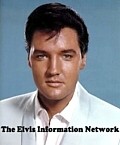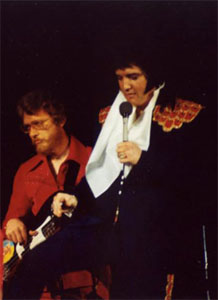'Way Down - Playing Bass with Elvis, Dylan , The Doors and more.
By Jerry Scheff
Book Review by Piers Beagley
|
Jerry Scheff, TCB Band bassist, has played behind some of the great names in popular music and spent several years in the US Navy before making his way to Los Angeles to begin the life of the session bassist - leading to his pivotal role in Elvis’ TCB band.
In his autobiography 'Way Down' Jerry Scheff gives us his view of some of music's biggest names as their audiences never saw them, tired at the end of a session, burned out after a show, inspired by a new song. Particularly interesting are his emotional insider tales of touring with the "Elvis Family".
Telling his story for the first time, he blends memories of childhood and adolescence with evocative anecdotes about studio sessions end encounters with a host of major stars.
EIN's Piers Beagley reviews this fine book & includes some delightful extracts.
|
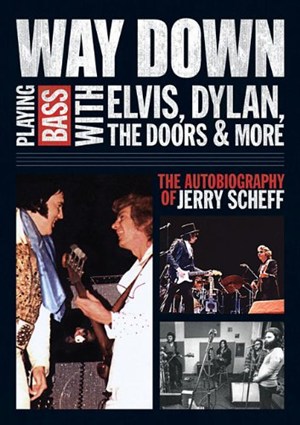 |
Jerry Scheff, TCB Band bassist, has played behind some of the great names in popular music and spent several years in the US Navy before making his way to Los Angeles to begin the life of the session bassist - leading to his pivotal role in Elvis’ TCB band.
Jerry Scheff has a very endearing and warm style of writing. Reading his biography is like listening to a favourite Uncle telling you his old stories. Some you will have heard of, but now they are more fleshed out and even more interesting. Especially when we know the key players all too well! One oddity about the book is how he jumps around with the chronology at times but while this could be annoying, most times it is understandable.
The book is 235 pages – full marks for a good index – of which Scheff’s stories with Elvis take up 68 pages of the book.
Jerry’s tale of his early years and first becoming inspired as a bass-player, even though not being involved with Elvis, is a sheer delight. There are some revealing stories of 50s’ racism in the black jazz music scene and some interesting revelations on how the jazz, R & B and soul musicians often intersected in their session and stage work.
The story of his first true gig as a white, skinny, 14 year-old in a duck-tail hairdo trying to impress a seriously cool black jazz band – paying until his fingers bled – is a fabulous tale. As well as being just one insight on how hard it is to become a successful musician.
A load of producers and musicians have passed through Jerry’s life and it is amazing the amount of links there are in bands and recordings one has heard of over the years.
Jerry started playing with up-coming stars like Billy Preston (The Beatles etc) as far back as 1965 before recording with the likes of Sammy Davis Jr and Neil Diamond.
There is also the strange oddity of Red West calling him up to play on Elvis’ ‘Easy Come, Easy Go’ session. Red West asked "Are you Jerry Scheff the trumpet player?", to which Jerry of course agreed - although he had never played trumpet before in his life!
(You will have to get the book to read his wonderful stories about starting out as a Tuba Player!) |
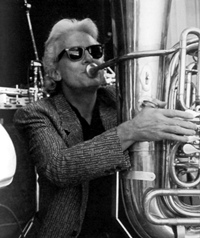 |
In his tales of Elvis and touring with the TCB Band, Jerry imparts some real warmth and joy of what it was like to be so close to all these wonderful musicians we feel we know so well.
The book starts with the fateful day of August 16th 1977 but it is a real pleasure of the book that Scheff tells of you the shocking news in such an open, honest and warm manner. He welcomes you to the TCB family in such a special way - even on the day when they heard the devastating news.
... The Sweets loved to laugh. Their laughter was frequent, irresistible, and often naughty sounding. They could laugh with joy at the coming of the Lord and still sound as if they were up to no good. They usually got tickled toward the end of some muffled, indistinct narrative where Myrna would interrupt with a few short bursts of flea-in-the-throat choking sounds: "Eh! Eh! Eh!" Whenever I heard that, I knew what was coming: the others would join in with a chorus of ascending air-raid-siren oooooooohs that would eventually explode into window-rattling belly-busters. For me, a bummed-out bass player struggling down the aisle with my carry-ons, this was redemption at its finest. Add to that the grins and nods from my friends, and by the time I had belted myself in I was suddenly in the mood to tour.
From a relationship point of view, the Elvis Presley group in 1977 was analogous to a big, peaceful, acquiescent middle-aged couple that could still get it on. Actually, we'd gotten better over the years—eight of them, as a matter of fact—since we started playing together. We'd been through all the mock-conjugal bullshit, the old bones of contention had long been buried, and we were still ready to rock hard on a moment's notice.
It helped that none of us were big stars—well, maybe one or two of us thought we were—and that none of us was extremely wealthy (much as some of us liked to give that impression). And we all absolutely despised luxury jets with catered sushi and Dom Perignon, so we usually travelled, courtesy of Colonel Tom Parker — in an old, slow, prop-driven Lockheed Electra with a closet full of Fig Newtons and Cheetos.
Despite all this, we had a kind of perverse fondness for the Electra. It was like a big comfortable bathtub with seat belts and it rode soft and slow like an old Cadillac. The seats were in standard airline configuration except for a horseshoe-shaped lounge area in the back, where we could stretch out for a nap or huddle together to tell stories as we smoked a reefer. Laughter usually permeated the airplane going out, while snores took over on our way home at the end of the tour.
In the book Jerry Scheff reveals what it was like to spend time with all of Elvis’ musicians but also has some particularly wonderful tales about Glen D Hardin and Ronnie Tutt both of whom he was very close to.
Who knew that Scheff and his family, as well as Glen D Hardin, opted to move into quiet Las Vegas apartments in preference to the noise and craziness of living in the Hilton hotel for free? His pet parrot Otis also features in some wonderful tales!
There are stories of JD Sumner and The Stamps in Elvis’ cool "super-fly" suits, humourous on-stage pranks, getting involved with the Mafia, the troubles with Colonel Parker, getting close to young "Groupies" and all the other trials of being on-tour. |
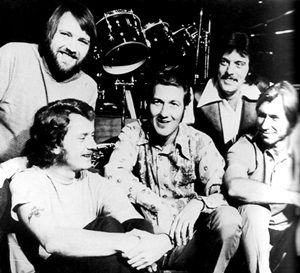 |
One feels that there is a real truth to his biography and while Jerry doesn’t bad-mouth anybody nor does he evade the topic of pretty heavy-duty drug taking that was all part of the 70s and 80’s culture.
In fact he tells a marvellous tale of a joke played on him at the Jungle Room sessions..
... Now, I am a little hazy about dates and what happened when, but I remember the actual events. The first time I had to travel to Graceland to record, I was booked into a Los Angeles session during the day and had to grab a flight to Memphis straight after that to get me there in time to start recording with Elvis—who had always been a night owl—after dark.
I was driven straight from Memphis Airport to Graceland, but when I got there Elvis wasn't ready yet, so I ate some dinner and shot pool for an hour or two in an adjoining room. Finally, somebody announced that Elvis was on his way down. I went back to the Jungle Room and tuned my bass. Apart from a few hours sleep on the airplane, I had been awake for about 20 hours by now and I was ready to drop.
I was quite close at the time with David Briggs, one of the keyboard players, and I asked him if he had any amphetamines. He reached into his pocket and handed me a pill, which I stuffed straight into my mouth.
David then went around the room and told everyone, including Elvis, that he had just given me a Quaalude (muscle relaxant) and that they should watch me melt into my seat. We started the first song and I kept looking for that first rush from the pill but soon realized that I was heading the wrong way. My mind was telling me what to play and when to play it, but my arms and fingers were playing to their own instincts. Finally, my hands just slid off the fingerboard of my bass, and as I looked up I could see everyone laughing their asses off.
As it happened, that take of the song — I think it was 'Way Down' - was great except for the bass part, so somebody picked me up and brought me some coffee and an amphetamine. After a break I replaced the original bass track, which had sounded like snakes crawling across the strings.
Another exciting section is on what it was like to be there playing for Elvis on Opening Night July 31, 1969….
... We were all packed into Elvis's dressing room, all trying to talk at once. I can remember Elvis sitting on a couch, his knee going up and down like a piston and his hands dancing like butterflies. (He had surprisingly delicate hands.)
He tended to stutter a little at times of stress, and this was a stressful time for him: "I ... I ... I ... ." All of a sudden, The Sweet Inspirations got up, kissed and hugged Elvis, and went on stage. Like bagpipers leading the Scottish clans into war, they were the first in the frontline of fire.
You'll have to get the book to discover the full tale of why the TCB Band always used the phrase "God among the lobsters" as they headed to the stage.
In another chapter Jerry Scheff reminisces about being invited over with his wife for a private dinner with Priscilla and Elvis …
... This was right at the time when Elvis had his big infatuation with law enforcement—and especially guns.
Priscilla and Elvis greeted us at the door and I remember thinking it was odd that Elvis was wearing a suit when we were told to dress casual. We walked through the dining room past a stand on which was perched a gorgeous, huge macaw. Priscilla asked us if we liked chilli as we all sat down at a seating arrangement of a couch and easy chairs.
Elvis immediately took over and, opening his coat, drew out a pistol. We all laughed and then Elvis started pulling guns out from everywhere: from under his coat, from shoulder holsters, from his ankles—he even pulled a couple out of his sleeves, which shot out on extensions when he pushed a button. Finally, out of nowhere, he produced a regulation police flashlight that squirted mace. (Not at us, fortunately).
He was being humorous with all this, of course, and actually I was very entertained and glad that he had broken the ice. After the whole exhibition was over, Elvis got up and said he would be right back. We had just started talking to Priscilla when we heard a door shut right behind the wall we were sitting against.
Then we heard a metallic clunk, then another, and then another. After a few more clunks, Priscilla started laughing and said: "Sounds like a knight taking off his armour!" We were still laughing when we heard the toilet flush and, after a few minutes, Elvis appeared from around the corner.
Priscilla let him in on the joke and we all had a good laugh together. They were both very charming, and Vivian and I soon felt at ease. I left with the feeling that—given the chance—Elvis and I could become friends.
Jerry Scheff’s stories about Elvis take up around a third of the book but don’t let that put you off as the rest is filled with marvellous tales of all sort of musicians, such as working with Roy Orbison, Elvis Costello, John Denver (some great stories there) and The Doors.
There is also a lovely chapter about touring with Bob Dylan and his Rolling Thunder Review. In fact I would have actually seen Jerry Scheff in concert on that very tour as I saw Bob Dylan that year - but I never noticed it was him!
As with any auto-biography there is a few chapters dedicated to the early years his family and family life. I had no idea Jerry would opt out for a while for basic ‘island living’ fishing for crabs and oysters. His tales of living with Otis the parrot are particularly funny.
At the end of the book there's a very telling story of why Jerry quit the 'Elvis In Concert' tour. And it all comes down to wanting to play real music!
In the middle of the book are 16 pages of black & white photos of Jerry playing with various bands which helps put the stories into visual context. Fans will however have seen most of the photos of Jerry playing with Elvis. There is an unfortunate mistake where a two–page spread of Elvis performing in Madison Square Garden is labelled as being from the Aloha special! I also wish they had used a better looking photo of Elvis on the front cover. |
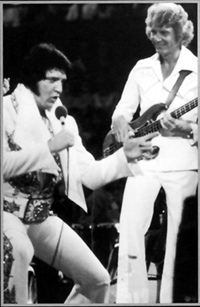 |
Overall Verdict: This is a delightful book that I would recommend to anyone interested in what it is like to survive a successful career as a working musician. There are plenty of great insights along the way and Jerry Scheff’s writing style is very easy to read. Of course most people will buy the book only for the stories of Elvis but there is much more here to enjoy. With plenty of laughs and lovely insights along the way, you learn a lot not only about Elvis and the TCB Band but also about other well-known musicians. If you like the extracts above I suggest you track it down. And you can get it for less than $14 from Amazon, great value.
Review by Piers Beagley.
-Copyright EIN April 2012
EIN Website content © Copyright the Elvis Information Network.
Click here to comment on this Review
| Jerry Scheff autobiography OUT NOW - Purchase here >>
From the publisher's pr: In this candid and perceptive memoir of his 45-year career, bassist Jerry Scheff takes us onto Elvis's private jet, on tour with Bob Dylan, and into the studio with the Doors. A stalwart presence behind some of the greatest names of popular music, Scheff has also played with Roy Orbison, Elvis Costello, the Association, Neil Diamond, Johnny Mathis, the Everly Brothers, John Denver, and Nancy Sinatra, to name just a few. Eschewing hype, Scheff provides a behind-the-scenes perspective, from having worked sleeves rolled up, side by side, with the great artists in their factories. The book opens with the TCB band's learning of the King's death while en route to a tour date, a pivotal moment for him, the rest of the band, and the world at large. He then proceeds on a nonlinear journey that mirrors the process of true life-reflection, from his roots in San Francisco to his touring all over the world. This is a tale of a man who has truly grown a career from a genuine love of music and of his instrument, proving how following that gift can bring a person to places beyond his wildest dreams. It is an exciting inside view of the evolution and craft and work of making rock and roll - a must-have for true music craftsmen and music junkies in general. |
|
EIN Website content © Copyright the Elvis Information Network.
Elvis Presley, Elvis and Graceland are trademarks of Elvis Presley Enterprises.
The Elvis Information Network has been running since 1986 and is an EPE officially recognised Elvis fan club.
|



